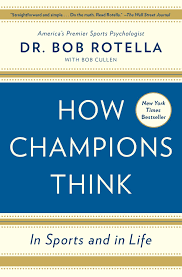Key quote:
“The ideas people choose to have about themselves largely determine the quality of the lives they lead.”
Key concepts:
Optimism: Optimism is a choice, not a birthright. It won’t prevent failure, but it determines how you react to failure.
Confidence: The belief in your own talent aids in achieving exceptional results and building this kind of confidence is a continuous endeavor.
Perseverance: Commit yourself to an improvement plan to achieve your goals.
Vision: Have a lofty dream – be aggressive with your goals.
Mental focus: Keep your eyes on the goal like a laser, nurture the cycle of learned effectiveness, and put even your nerves to work for you.
High standards: Seek to self-evaluate, work to avoid perfectionism, and learn when to listen to the competition (and when not to).
Strategic thinking: Work smart, not just hard. Be patient in the process, seek and give support, and be coachable.
Passion: Not everyone is passionate about their job, but an exceptional person will figure out a way to get enthusiastic about the work they have to do.
Optimism
Optimism will not prevent failure, but it determines how you react. “Misfortune happens to everyone. Champions just refuse to let it push them into doubtful, fearful thinking” (p. 29).
Learning to be optimistic: Excellence in any field is statistically unlikely, so you twhen hink optimistically about your chances, or you don’t bother trying. No one is born optimistic or pessimistic. Optimism is a choice.
“While the correlation between optimism and success is imperfect, there is an almost perfect correlation between negative thinking and failure” (p. 27). Optimism will not prevent failure, but it determines how you react. “Misfortune happens to everyone. Champions just refuse to let it push them into doubtful, fearful thinking” (p. 29).
Confidence
A confident self-image: Doubt and fear are not conducive to good performance. “Champions understand that they must be confident to a point that some people might find offensive” (p. 40).
Building confidence is a continuous process, including feeding “useful, positive thoughts to the subconscious” savoring positive experiences and not dwelling on negative ones, and working on both skills and confidence at the same time (p. 34).
Respecting your talent: It is possible to overestimate talent, and the mental game and the work are just as important as talent. But “one of the best character traits for achieving excellent results is a belief in your own talent” (p. 66).
Perseverance
Commitment, perseverance, and habit: It is important to commit yourself to an improvement plan you develop. Perseverance is “a set of good habits directed at whatever goal you want to accomplish” (p. 90).
Build good habits consciously and deliberately over an extended period. Turn bad habits into good ones by removing negative cues or planning out a different response to these cues. Recruit your conscious mind “to overrule the subconscious impulse that is the crux of your bad habit” (p. 97). Use charts or a written record of behavior and to-do lists to motivate yourself.
Stick to your process and trust it. Don’t focus heavily on outcomes on any given day. “Train it and trust it,” or “learn the skill so thoroughly, so it’s ingrained in your subconscious” (p. 92).
Vision
“When you aim high … Even your failures will be better than most people’s best” (p. 113). Lady Gaga’s suggestion is for people to “walk around delusional about how great they can be and then to fight so hard for it every day that the delusion becomes truth” (p. 276).
Dreams, goals, and process: Dream big and create a process to reach your dream and stick to it, day in and day out. Whenever you set a goal, you make a commitment.
Be aggressive with your goals. “In sports or in business, if you’re not aspiring to dominate, to be the very best, you’re coasting” (p. 110). People rarely exceed their goals, so make them lofty!
“When you aim high … Even your failures will be better than most people’s best” (p. 113). Lady Gaga’s suggestion is for people to “walk around delusional about how great they can be and then to fight so hard for it every day that the delusion becomes truth” (p. 276).
Mental focus
Being single-minded and “learned effectiveness”: Exceptional people keep their eyes on the goal with a single-minded dedication. They are not distracted by non-essentials. They reserve time for family and relationships, and they “devote a disproportionate amount of time to their work” (p. 117).
“Learned effectiveness” is a “virtuous cycle” that grows from optimism, persistence, and success (p. 131). When people learn to persist, they get better, and they find success and respect their own talent. Success contributes to optimism so that the process builds on itself, and successful attitudes and behaviors are not at the mercy of a bad day.
Nerves and the performance process: Use worry and fear as a “cue” to prepare – see them as a friend to help prompt you to prepare and succeed. Rely on a preparation process or routine to help your mind get out of the way. “Train it and trust it” (p. 142). Immerse yourself in what you do best and forget the outcome.
High standards
Evaluating yourself: What if everything you did all day was on the nightly news? Set your own standards and hold yourself to them. “Exceptional people, in my experience, are almost always good at the tricky art of self-evaluation” (p. 167). Compare your performance to how well you stuck to your process. The process is first, the outcome is secondary.
Going through the fire: Having high standards doesn’t mean that you beat yourself up for every mistake. “Perfectionists almost never arrive at the highest levels of sport. They can’t survive” (p. 183). Champions, however, are “resilient in the face of failure and adversity” (p. 177).
Strategic thinking
You cannot succeed alone – you are going to need other people in your corner. Don’t take your support people for granted. “Exceptional people reward the people who help them by being loyal, enthusiastic, and helpful” (p. 237).
Working hard, working smart: Hard work is essential but won’t take you all the way. “Work very hard at reaching your goals, especially when you’re young. But as you get older, keep in mind that to continue to rise, you have to work smarter, more efficiently, more strategically” (p. 197).
When to heed the competition and when to ignore it: Be aware of the standard the competition is setting but know when to watch the competition and when to ignore it. “Compare yourself to people who are similar to you in ability and development” (p. 204).
When to be patient, when to be impatient: “Exceptional people are impatient with the limits others place on them … but show enormous patience when they’re working at a process that they believe will make them better” (pp. 222-223).
Surrounding yourself with the right people: You cannot succeed alone – you are going to need other people in your corner. Don’t take your support people for granted. “Exceptional people reward the people who help them by being loyal, enthusiastic, and helpful” (p. 237).
Passion
Doing what you love or loving what you do? Explore areas within your field and others to see what you excel at, then learn to love what you do. Rotella insists, “enthusiasm acts like a catalyst that makes all the other attributes of a champion’s mind work better” (p. 246).
“Figuring out where your real talent lies is an important part of remaining enthusiastic about what you do” (p. 248). “Somewhere and somehow, exceptional people find a way to bring that enthusiasm to what they do, and they find it every day” (p. 260).
Sticking with your bread and butter: “There’s a happy medium between listening to everyone and taking all the advice you’re offered and listening to no one and stubbornly hanging on to the same flawed techniques and habits” (p. 268).
Creating your own reality: Dreams should be unbounded. Plans should be realistic, but the exceptional person dreams extravagantly. “He sets about making his vision a reality” (p. 270).
A life of going for it
You might ask, “What if I commit to all of this and still don’t make it? Why bother to try to be exceptional?” In thinking like a champion, we live life to the fullest and learn to handle all of life’s wins and losses with calmness, composure, and grace. We can find deep satisfaction and peace in the great effort towards excellence we give each day.

“Figuring out where your real talent lies is an important part of remaining enthusiastic about what you do” (p. 248). “Somewhere and somehow, exceptional people find a way to bring that enthusiasm to what they do, and they find it every day” (p. 260).
Rotella, B (2015). How Champions Think: In Sports and in Life. New York: Simon & Schuster.
